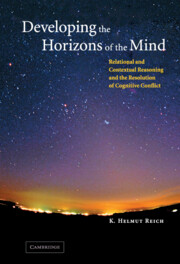 Developing the Horizons of the Mind
Developing the Horizons of the Mind Appendix 1 - Interviewing techniques
Published online by Cambridge University Press: 22 September 2009
Summary
Preparations
This appendix focuses on the type of interview used for ascertaining the RCR level at which the interviewee argues, not on interviewing in general. To produce satisfactory interviews for the stated purpose, a future interviewer needs to be trained threefold. First, he or she needs to learn how to encourage the interviewee to present his or her genuine views as distinct from what just comes to mind, is thought to be the desired answer, or is a repetition of something heard or read. Second, the future interviewer needs to learn RCR theory, and have the level descriptions (see Table 4.1, p.) firmly in mind, this in order to ask clarifying questions in case of ambivalent answers regarding discriminating level criteria. Third, the interview dilemmas need to be known from all angles and ‘interiorised’. For convenience, the three standard dilemmas are reproduced below:
Pianist. The young pianist is fully immersed in her playing: her fingers speak to the chords via the keys, the movement of her body follows the music's rhythm, and her mimic gestures express her intense inner participation. After she has played the last note, the audience applauds enthusiastically. The pianist is satisfied with her performance, but wonders whether it is more due to her practising or to her natural endowment. What is your view?
Accident in a nuclear power plant. A TV news station reports on an accident in a nuclear power station. The main cooling pump had stopped working, and the back-up pump did not function.[…]
Information
- Type
- Chapter
- Information
- Developing the Horizons of the MindRelational and Contextual Reasoning and the Resolution of Cognitive Conflict, pp. 191 - 193Publisher: Cambridge University PressPrint publication year: 2002